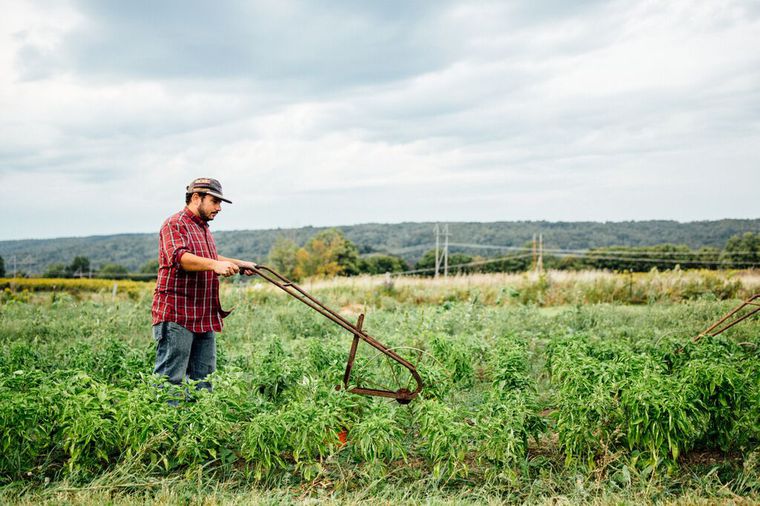In the 21st century, small farming appears to be as risky as it has ever been. While many farmers love the life they have and wouldn’t want to do anything else, the dual challenges of global economics and changing weather patterns make commercial small farming a pursuit that is not for the faint of heart. Both vegetable farming and the raising of livestock are subject to the whims of nature and the competition of big business.
Common Problems for Small Farmers (and how to overcome them)
In the 21st century, small farming appears to be as risky as it has ever been. While many farmers love the life they have and wouldn’t want to do anything else, the dual challenges of global economics and changing weather patterns make commercial small farming a pursuit that is not for the faint of heart. Both vegetable farming and the raising of livestock are subject to the whims of nature and the competition of big business.
Those of us who enjoy gardening in the home garden have little control over weather patterns, but we are not dependent on this source of income. We garden because we love to, not because we need to make money from our time in this good earth. For those who depend on agriculture for their livelihood, it is a way of life, and it can be both rewarding and challenging, depending on the individual.
Getting Started
One common problem small farmers face is getting started. Many people with knowledge of various gardening techniques and experiences may not have the money to put into their business, and may not want to take a risk with everything they have. Some of the things a small farmer needs in order to get started include:
- Money
- Land
- Good equipment
- Good seeds
- Good plants
- Knowledge about marketing
If you have even some of these things, it is possible to get started, but if you don’t have everything, it may be difficult. New farmers should have an educational background in the things that interest them, as well as a practical one. If you have the money, but no land and no knowledge of farming, it is unlikely that the business will survive long. If you have the land, but no money, you may be able to lease a place on which to operate but you will have to do the work yourself and have no one to hire. Likewise, if you have the land but no equipment and you are just starting, you may be able to make a little money but you won’t be able to establish a permanent entity. Perhaps you have the money and the equipment, but no land. This may be the very best way for getting started, but you want to have locations in mind before you begin spending money.
Then there is the business side of things. If you don’t have any knowledge of marketing, you will have a very hard time keeping your farm in operation. The same is true if you haven’t taken the time to educate yourself on starting a farm business.
All of this may lead to discouragement, but there is a way out. Start somewhere where you can get good at something that you want to do. Once you build your knowledge and experience, you can move on to other parts of the business. By starting with the easiest part of the business, you can begin to buy your way out of the other difficulties. For example, if you love to grow flowers, go ahead and start with bedding plants. Once you get good at this, you can upgrade to a small field of homegrown seedlings. You can sell these at the local Farmer’s Market and use the profit from these to start your farming business.
Once you get enough experience to be knowledgeable, you may be able to purchase some land and begin to build. It is also possible to lease a small piece of land and grow some small items for yourself and others who want to purchase your items. This is a decent way to get started, but it makes it easy to become discouraged if you want to do more than you’re capable, or if you don’t make as much as you want.
People who want to start a small farming business can make great money if they have a good education in farming, are intelligent enough to learn and are dedicated to the practice. It is a difficult business that requires a lot of knowledge and frequently a great deal of capital. But, if you have the right plan in place, it does not have to end in failure.
Common Problems for Small Farmers:
- The inability to raise money.
The inability to raise money has been the number one problem with farmers for as long as farmers have been around. It is one of the reasons why most people today who engage in small scale farming also engage in a job outside of farming.
- Getting started.
Getting started on a small scale farm usually involves a large amount of money up front. This is often out of reach for most people.
- Environmental Concerns
Environmental concerns are often raised when people think of farming. It is often difficult to convince a community or the government that farming is safe for the environment.
- The Lack Of Institutional Help.
There is an extreme lack of institutional help for farmers. This means farmers are often left to deal with all their problems on their own.
- Crop Failure/Extreme Weather Issues
How farmers weather the elements can often mean the difference between fortune and bust. Even when a farmer is providing something needed, the weather can result in the farmer’s work being for naught.
- The Difficulty of Finding Locations for Farms.
Farmers often find it difficult to find good locations for farm land. This is especially true in a world where a farm has to make money. A disused factory is often more attractive than a disused farm.
- The Need For Technology.
Farmers often find themselves unable to compete with large scale farms because they cannot afford the latest technological advances.
- The Impact of Industry.
Industry can often force farmers off their land if the farm cannot withstand the development of big business.
- The Need for Education.
This is such strong need for some farmers that they attend college and often find themselves with a job outside of farming.
- Possible Health Risks.
The nature of the work done by farmers often means that farmers can be exposed to toxic substances. Because of this, farm accidents can expose people to substances that can cause various health problems.
- The Shifting Nature of the Business.
The business is highly dependent on conditions outside the control of the farmer. While this can lead to the farmer’s success, it can also mean that controlling conditions is the key to success.
- Lack Of Optimality.
It is often said that farmers want an optimal environment but companies only need a good enough environment. This means it is often difficult for farmers to be competitive because they care about every little detail of farming.
- The Impact of Nature.
Nature has a way of showing those who challenge it who is boss. While farmers want to have control over nature, nature does not always listen to the farmer’s desire for control.
- Lack of Direct Market.
Farmers often have to go through several middlemen before they can get their products to the end consumer. This makes it hard for farmers to know when they are making profits from their products.
- Inability to Ensure Consistency.
When farmers must rely on seasonal production, it means they are unable to ensure consistency from year to year. This makes forecasting profits more difficult.
- Additional Health Concerns.
Working conditions on many farms are quickly becoming more dangerous as people are exposed to more toxic products.
- The Need For Security.
When a farmer has nothing in place, they are easily displaced by companies looking to control land.
- Lack Of Infrastructure.
Farmers often find that government agencies are uninterested in providing services to farmers. This is not always because government agencies are afraid of farmers, but because they lack the money and resources to be of assistance.
- Weak Knowledge Of Marketing.
Many farmers are not good at marketing and that can lead to failure.
Small Farming Resources:
- Increasing Farmer’s Income in Sub-Saharan Africa: Case Studies (Google eBook):
“This report gathers together a set of best practices demonstrating how initiatives by local and international organizations are addressing the needs and constraints of smallholder farmers in order to increase farm incomes and improve food security in sub-Saharan Africa.”
- Small Scale Agriculture: Business Planning Workshop: Small Scale Agriculture-Business Planning
(Google eBook) :“Small-scale agricultural production is an important economic sector in Africa and elsewhere. It provides more than 70% of the food consumed by small-scale farmers and their household members, consumes approximately 40% of rural employment, and generates approximately 50% of agricultural gross domestic product for many African countries.”
- Small Farm Cooperatives: Volume II (Google eBook): Small Farm Cooperatives: Vol II,
“This is the second of three volumes of a study on small farm cooperatives prepared by the Office of International Cooperation and Development, Office of the Under Secretary for Foreign Agricultural Service, United States Department of Agriculture. The study was undertaken to gather information on small farm cooperatives which might be of use in planning development assistance programs for these types of organizations.”
- Agroforestry: Small-scale Forestry for Rehabilitation of Degraded Ecosystems:
“This study examined the role of agroforestry in the rehabilitation of degraded tropical forest ecosystems for the purpose of developing an agroforestry production systems concept applicable to the smallholder farming systems of West Africa and Sub-Saharan Africa in general.”
- Small-scale irrigation systems: AfRB/UNDP Training Manual: UNDP African Regional Centre
“This manual is the result of a series of training workshops conducted by the AfRB for non-governmental organizations (NGOs) in Africa on small-scale irrigation.”
Other Helpful Resources:
- The Small-scale Farmer Food Security Sourcebook: Practical Lessons from International Experience
- Farmers’ Information Network
- Gardening without Digging
- Community Gardening Handbook
- Seed to Seed: The Secret of Seed Saving
- Organic Farming and Seafood
- Beginning Farmers
- Starting and Managing a Small Business
- Fresh Food From Small Spaces











